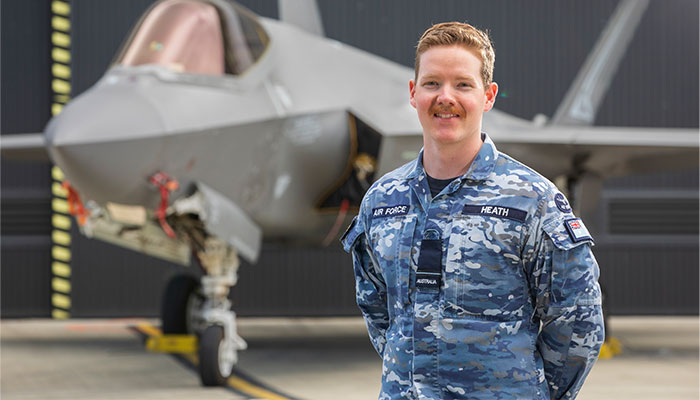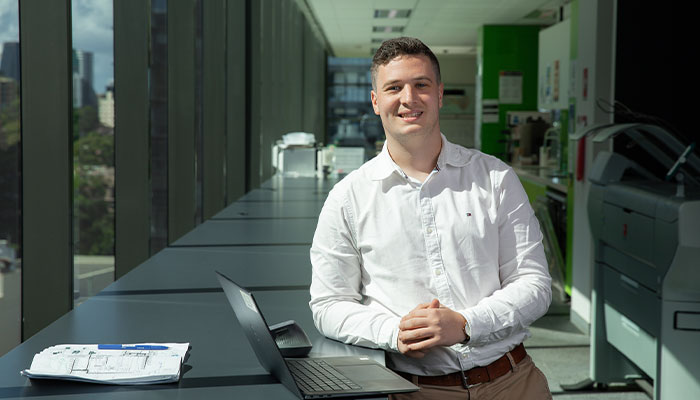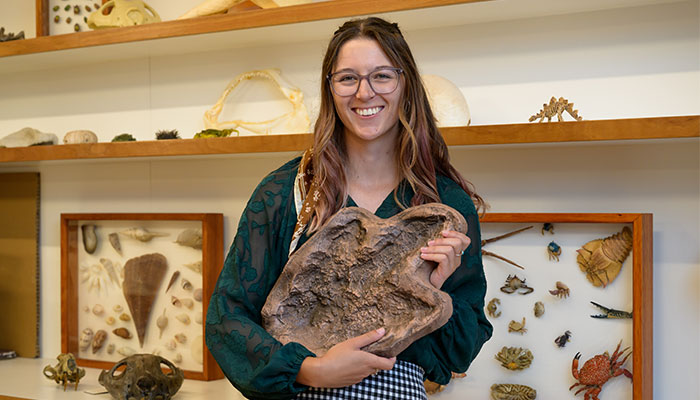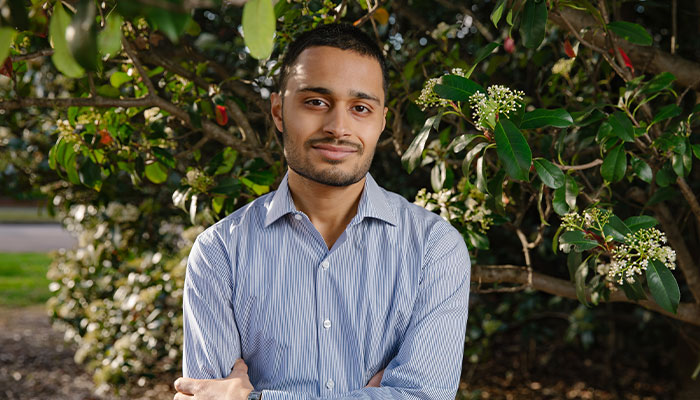Jeremy Heath works at the forefront of Australia’s defence capability — sourcing parts for the nation’s expanding fleet of F-35 multi-role fighter aircraft.

Insights: Jeremy Heath says his studies at Macquarie University helped equip him for work.
Armed with a Bachelor of Commerce (professional accounting) obtained from Macquarie University in 2020, Jeremy serves as a Royal Australian Air Force (RAAF) Logistics Officer. He’s in charge of the resupply warehouse in Williamtown near Newcastle, for Australia’s fleet of F-35s, the world’s most technologically-advanced fighter jet.
The aim is to keep our jets in the air. This involves liaison with contractors [local and global] as well as uniformed members such as engineers, technicians and logisticians so spares are delivered to get aircraft back online,” he says. “Technical skills, soft skills and time management are all equally critical to mission readiness.’’
Heath helped hone his technical and soft skills at Macquarie in group projects. These skills included problem solving, time management and conflict management, all developed while holding down part-time employment at Bunnings warehouse.
At high school and university, he never imagined becoming a commissioned RAAF officer. “When I began uni, I was uncertain about my career goals. I had an interest in forensic accounting however I was not sure where I wanted to go with it,” he says.
Macquarie University helped me by giving me a baseline understanding of business processes, particularly budget management and responsible allocation of funds.
The highlight of his time at university was an exchange study program with Florida International University in Miami. Apart from exploring the Florida Keys by kayak or by air-boat, he befriended many American students.
“Going on exchange really forced me to come out of my shell and I absolutely loved it,” Heath says. “It was eye-opening because I met some people who were in the US Air Force. This gave me context to the American defence system and how it interacts with its allies such as Australia.”
Real-world ready
Returning to Australia in his last year at Macquarie, Heath felt he was becoming more equipped to work. “I was learning how accounting processes enable businesses to function and the importance of effective fiscal management,” he says.
“This is really important in the corporate world and especially within the government. My lecturers and tutors reinforced this with real-world examples.”
With an ambition to join the RAAF, Heath began a competitive recruitment process which involved physical, health and psychometric tests as well as rounds of interviews.
Once he was accepted into the Defence Force, he completed 18 weeks of Officer Training School in Victoria and then went to RAAF Base Wagga Wagga for logistics training.
Today, he holds a two-part role in Williamtown. As well as being a supply chain manager assisting the F-35 program, he also manages a 12-person logistics section as the Officer in Charge (OIC). “I help ensure my team gets adequate performance recognition, career advancement, and training opportunities, so that logistics support is provided to our F-35 fleet,” he says.
And he’s continuing his balancing act as he embarks on a Masters degree as well as several project management qualifications, all while working full time keeping jets in the air.
Degree: Bachelor of Commerce (professional accounting)
My job: Logistics Officer, the Royal Australian Air Force (RAAF)
How Macquarie helped me to be job ready
1. Technical knowledge: “Macquarie helped me by giving me a baseline understanding of business processes, particularly budget management and responsible allocation of funds."
2. International experience: “The University offered me the opportunity to live and study overseas and learn about the USA."
3. Time management: "I also developed time management by balancing work and study. All of these go hand-in-hand with what I need for my current job.”
How I apply what I learned at Macquarie in the workplace
“In Defence, we’re using public money so we’re very mindful of our allocation of funds. The efficient and effective use of budgets is paramount to defence capability; mistakes can cost time and money, as well as have an adverse effect on the public’s perception of Defence. I learned all about effective budgeting and financial compliance in my degree."
Advice to prospective students:
“Don’t just limit your career to the corporate world. Defence has many excellent opportunities in business, logistics, engineering, IT and medical disciplines. Salary packages and professional development are very competitive and opportunity is everywhere, it’s an underrated choice,” says Jeremy.



